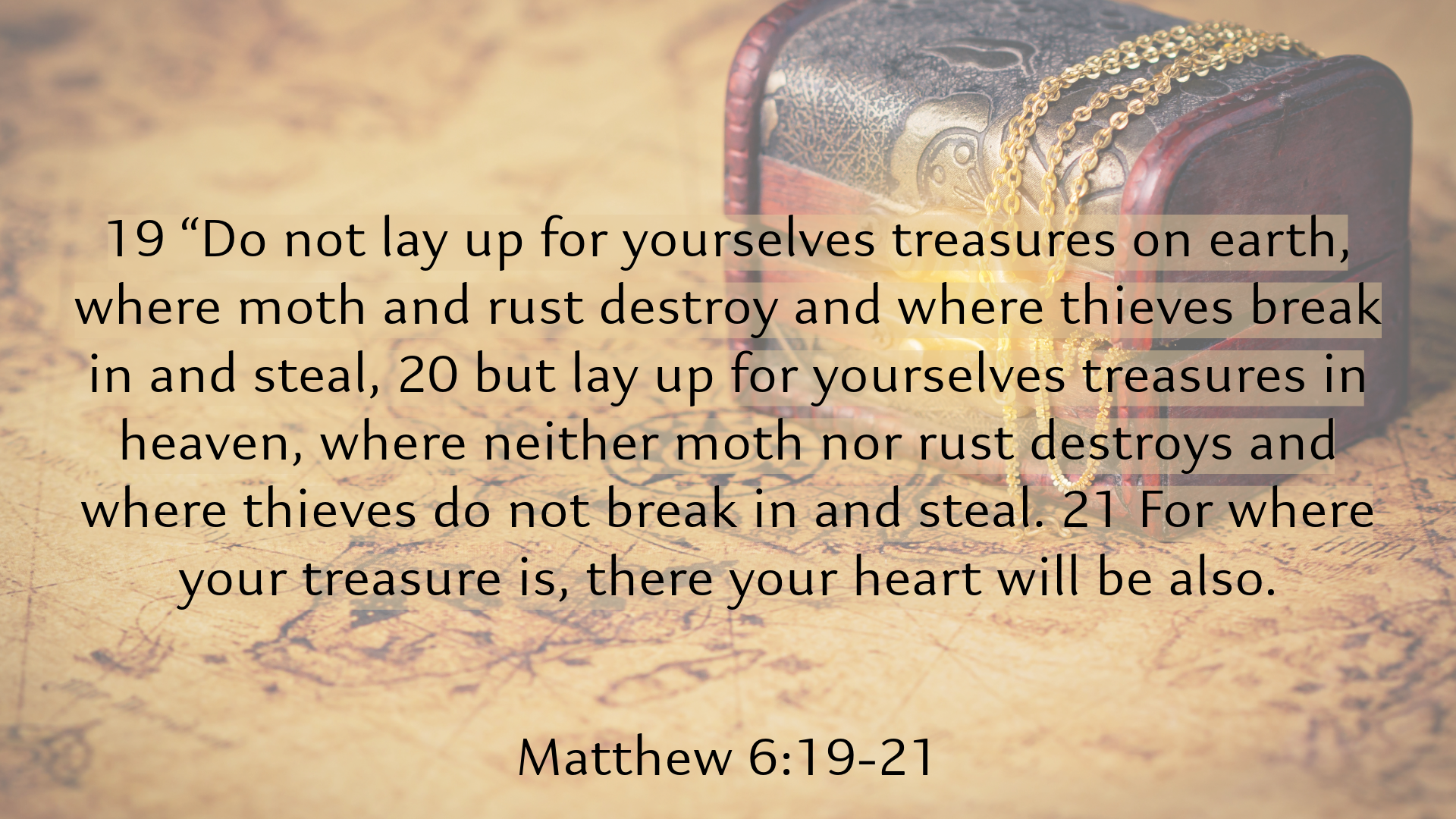Back in April, we took a deep dive into our motivations. As followers of Christ, we shouldn't be chasing applause or recognition from the world. Instead, our eyes should be focused on seeking God's approval and His reward. This month, we're going to be taking it a step further. It's not just about why we act but what we value. What does Jesus treasure? What matters most in the Kingdom? Just like the rest of the Sermon on the Mount, we're going to be challenged to rethink what the world tells us is important.
What do you treasure? Is it something that holds eternal value or just temporary worth? We will be diving into these questions further in this month's blog.

This section starts with comparing earthly treasure and heavenly treasure. Earthly treasure is temporary. It can be easily destroyed and taken away. However, treasures in heaven are eternal. That is where our heart should be – on heavenly treasure. But what is heavenly treasure? People. Our value should be on people, God's creation, instead of our temporary possessions.
It can be easy to say that you treasure what God values, but do you actually? Take a look at how you spend your time, money, energy. What are you investing in? You can learn a lot about what you value based on what you're spending your time and money on. Your life is either centered on things on earth or things in heaven – you can't be focused on both.
Oftentimes, people aren't intentionally building their lives around the pursuit of money, pleasure, power, and fame. That's the problem though, the above things have an automatic appeal because they provide instant rewards. They are easy to start pursuing, even if that wasn't your intention. How do we stop that from happening? We have to intentionally set out to build our lives on something else. Jeremy Bacon says in the Sermon on the Mount book,
"We will store up treasures on earth unless we deliberately decide not to."
To lay up treasures in heaven, you have to intentionally build your life around opportunities to invest in yourself, God, and others. This is what we should be building our life around. God and people are the things that will survive into eternity; therefore, those should be what we are investing in while on earth. As mentioned before, it all requires intention to pursue heavenly treasures, but it will be worth it in the long run.
While pursuing things like money, pleasure, power, and fame tend to be common, the interesting thing is even if you aren't a Christian, these don't actually bring the most happiness to people. There have been many studies done on pursuing happiness. One done by Arthur Brooks, a Harvard professor concluded that money, pleasure, power, and fame didn't actually make people happier. He found that genuine happiness is found in faith, family, friends, and meaningful service to others.
If "treasures in heaven" could be summed up in one word, it would be "love". Spend your time and energy on loving God and loving others. That is what is most important.

You can really evaluate what you value by looking at how you spend your time and money. Take time this week to look at where you spend your time and money. Does this align with what God values?
The eye is the lamp of the body
22 “The eye is the lamp of the body. So, if your eye is healthy, your whole body will be full of light, 23 abut if your eye is bad, your whole body will be full of darkness. If then the light in you is darkness, how great is the darkness! - Matthew 6:22-23
In the verses above, we talked about how we have to be intentional about what we are building our lives on. These next two verses emphasize that again. What we focus on shapes how we see the world.
Let's take a look at the Pharisees for an example. In Matthew 6:1-18, we see that their focus is on getting praise from people. While this might have brought them earthly status, it made them figuratively blind (see Matthew 23:26). We don't want this to happen to us!
There are many things in this world that we can focus on; however, Jesus makes it simple and says you can either focus on light or darkness. Sometimes we might not even realize that we're focusing on darkness because it is all around us. We have to understand how devastating focusing on darkness can be! Your perception on things eventually become the reality; therefore, we need to be focusing on the light. For example, if you're viewing people as grumpy and argumentative, you will eventually treat people like they are grumpy which tends to cause them to actually be grumpy. This is called a self-fulfilling prophecy. If our perspective is dark, then we will notice darkness more easily.
While it'll be difficult, we have to break the habit of looking to darkness. We have to be intentional about focusing on the light. In a world where we live in an "attention economy" where businesses have learned how to monetize our attention (think about how addictive scrolling on social media is), we have to be deliberate about what we give our attention to.

How can you be more intentional about focusing on the light? Think about the devices you use the most or the media you consume the most. What's your reaction to the idea of giving it up for a week? If you believe it would be really difficult, or almost impossible to do that, it's a sign that you probably need to scale it back.
Masters
24 “No one can serve two masters, for either he will hate the one and love the other, or he will be devoted to the one and despise the other. You cannot serve God and money. - Matthew 6:24
As a financial business, we've warned about the love of money before. There are many passages in the Bible warning us about the love of money. Money is a rival deity to God. It can be very easy to turn to it and rely on it instead of God – which is why the New Testament is constantly warning us about money and not making it our master.
Money can have chokehold on people. See these other verses talking about it:
1 Timothy 6:9-10
9 But those who desire to be rich fall into temptation, into a snare, into many senseless and harmful desires that plunge people into ruin and destruction. 10 For the love of money is a root of all kinds of evils. It is through this craving that some have wandered away from the faith and pierced themselves with many pangs.
1 Timothy 6:17
17 As for the rich in this present age, charge them not to be haughty, nor to set their hopes on the uncertainty of riches, but on God, who richly provides us with everything to enjoy.
Matthew 13:22
22 As for what was sown among thorns, this is the one who hears the word, but the cares of the world and the deceitfulness of riches choke the word, and it proves unfruitful.
Matthew 19:23-24
23 And Jesus said to his disciples, “Truly, I say to you, only with difficulty will a rich person enter the kingdom of heaven. 24 Again I tell you, it is easier for a camel to go through the eye of a needle than for a rich person to enter the kingdom of God.”
With these verse in mind, what should your attitude be towards money? You should be suspicious of it. That sounds extreme, but you really don't want to let your guard down on your attitude towards money. Yes, you can do a lot of good with money; however, you need to always be cautious because it can easily turn into a master in your life. In today's society, there is a big emphasis on money and how to make the more of it. When others around you are constantly trying to make more, you need to learn to be content with what you have.

At the end of the day, money is just a tool. It isn't a bad thing if it isn't the main thing in your life.
Do you need to shift your attitude towards money? Do you find yourself thinking, "if I could just make x amount of money, I'd be satisfied."?
Don't worry
25 “Therefore I tell you, do not be anxious about your life, what you will eat or what you will drink, nor about your body, what you will put on. Is not life more than food, and the body more than clothing? 26 Look at the birds of the air: they neither sow nor reap nor gather into barns, and yet your heavenly Father feeds them. Are you not of more value than they? 27 And which of you by being anxious can add a single hour to his span of life? 28 And why are you anxious about clothing? Consider the lilies of the field, how they grow: they neither toil nor spin, 29 yet I tell you, even Solomon in all his glory was not arrayed like one of these. 30 But if God so clothes the grass of the field, which today is alive and tomorrow is thrown into the oven, will he not much more clothe you, O you of little faith? 31 Therefore do not be anxious, saying, ‘What shall we eat?’ or ‘What shall we drink?’ or ‘What shall we wear?’ 32 For the Gentiles seek after all these things, and your heavenly Father knows that you need them all. 33 But seek first the kingdom of God and his righteousness, and all these things will be added to you. 34 “Therefore do not be anxious about tomorrow, for tomorrow will be anxious for itself. Sufficient for the day is its own trouble. - Matthew 6:25-34
The last part of this section is about worry/anxiety. This is a big problem we see today with so many people dealing with anxiety. In this section, Jesus says, "don't worry" three different times and even asks the rhetorical question, "why worry?"
Worry is when you focus on possible negative future scenarios. Specifically, ones that you do not have control over. It can be very easy to imagine all sorts of scenarios for the future. I know I catch myself doing this all the time. The problem with worry is we don't have control. This is where the difference lies between worry and problem solving. When you problem solve, you are focused on the things we actually have the power to influence.
When Jesus is telling us not to worry, he isn't advocating for irresponsibility. [Paul actually insists the opposite in 2 Thessalonians 3:6-12] Instead, Jesus is telling us to not focus on contingencies we don't have any control over. For example, worry about whether or not you have a job (there are some things out of your control in that); however, he isn't saying that we shouldn't work or do our best work in the job we have.
Worry doesn't actually accomplish anything. Oftentimes, it just paralyzes us and leads to more problems. While it's easier said than done, we must learn to trust God and focus on the Kingdom to help with our worry. In the Sermon on the Mount book, Jeremy Bacon states that things like fear, doubt, and worry won't just go away; however, that doesn't mean it has to drive the car.
Jesus doesn't give us a promise that if we trust God nothing bad will happen. But there is a promise that if we focus on the Kingdom and entrust the rest to God, He will do more than we ever could do on our own. How would your life be different if you had an 'abundance' mindset (that God gives and His giving isn't going to run out) rather than a 'scarcity' mindset?
This blog was a bit meatier than other blogs. It requires us to take extra time to reflect on our own life and attitudes. Throughout this month, take time to look into your life and what you're focusing on. Are you focusing on the Kingdom and the light? Or are you letting the world and darkness control your thoughts and actions?
Cornerstone Impact Update
Since January, we've been in part 1 of the book, Every Good Endeavor. The focus of part 1 has been God's design for work. May's blog started the second part of the book looking at the problems with work. If you missed the blog, you can find it here:

Eventide
There has been a rapid growth of Artificial Intelligence. In Eventide's recent webinar, they look at the essential trends they are seeing in the market and how their Business 360® research framework applies to the energy sector for values-driven investment opportunities. You can find the webinar replay here:







